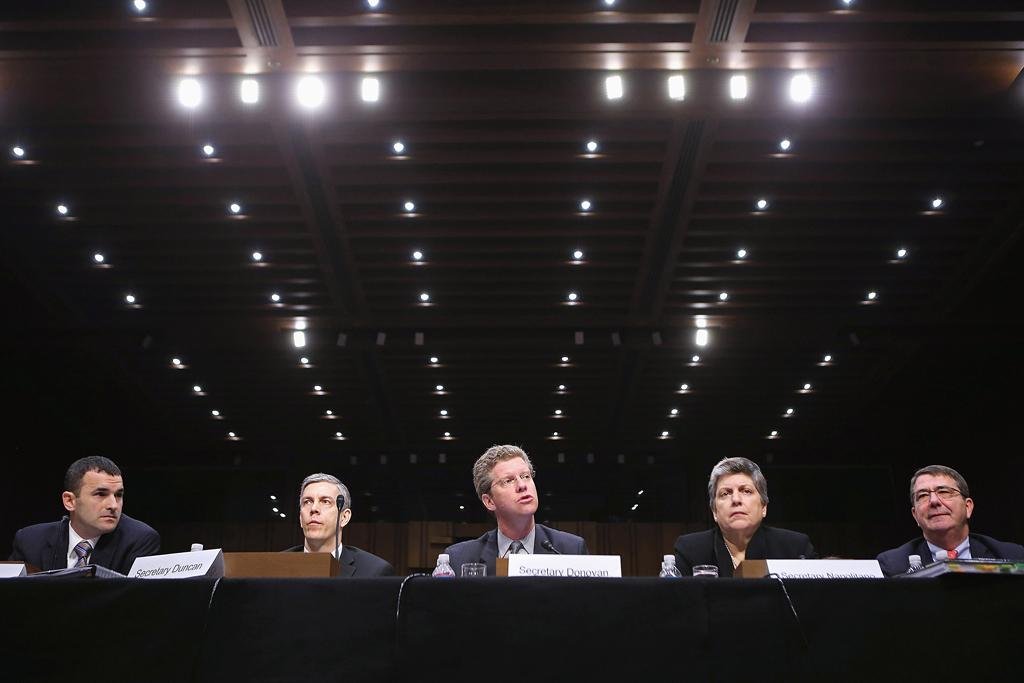The sequester: How will it affect you?
(L-R) Office of Management and Budget Federal Controller Danny Werfel, Education Secretary Arne Duncan, Housing and Urban Development Secretary Shaun Donovan, Homeland Security Janet Napolitano and Deputy Defense Secretary Ashton Carter testify before the Senate Appropriations Committee about the potential impacts of “the sequester” during a hearing on Feb. 14, 2013, in Washington, DC.
The sequester, mandatory federal spending cuts designed to reduce the US deficit by $1.2 trillion over 10 years, will begin at midnight tonight unless Congress suddenly agrees on a plan to avert it.
Once the sequester set in, a total of $85 billion must be cut from federal budgets in fiscal year 2013, which ends in September. The Congressional Budget Office says Defense Dept. cuts will total $42.7 billion, Medicare will lose $9.9 billion and other domestic spending will shrink by $32.7 billion, according to Mother Jones magazine.
The legislation forces Medicare to reduce its spending by cutting reimbursements by 2 percent. All other spending must be cut by the same percentage across the board – no normal budgeting behavior allowed, like reducing or canceling unnecessary programs to fully fund essential services.
The Office of Management and Budget estimates that, to achieve the spending reduction requirements, defense budgets will have to be cut by about 13 percent and non-defense budgets by 9 percent in 2013, the White House said.
Federal workers' wallets will take a hit. Furloughs could cut back work hours at least one day per pay period for 1 million federal employees.
But if you don't work for the federal government, what does this mean for you? It depends on where you live and what services you use.
The White House has published a state-by-state guide to the sequester’s impact in 2013, available here. Texas residents, for example, can look forward to 1,500 fewer teachers in their schools, 4,800 fewer children receiving Head Start services and cuts in financial aid for 6,170 college students.
The sequester is bad news for a wide variety of groups in 2013, including:
Small business owners: The Small Business Administration will provide about $900 million less in loan guarantees.
Scientists: The National Science Foundation will award about 1,000 fewer research grants, curtailing the work of about 12,000 scientists and students.
Travelers: Staffing reductions at airports and land borders will cause travel delays. According to the White House, peak wait times could increase to four hours or more at the nation’s busiest airports like JFK and LAX. Travelers could wait five hours or more at major ports of entry in California and Texas during holiday weekends.
Nature-lovers: National park administrators will cut costs by shortening visitor hours and reducing park maintenance. Yosemite National Park plans to collect trash less frequently and the Great Smoky Mountains National Park will close five campgrounds, National Journal reported.
Unemployed people: The 2 million unemployed workers currently receiving federally-funded long-term jobless benefits will see their payments reduced by 11 percent, MarketPlace reported.
The homeless: Budget cuts will force housing and emergency shelter programs to kick 100,000 people, including veterans, back onto the streets, according to the White House.
Every day, reporters and producers at The World are hard at work bringing you human-centered news from across the globe. But we can’t do it without you. We need your support to ensure we can continue this work for another year.
Make a gift today, and you’ll help us unlock a matching gift of $67,000!
